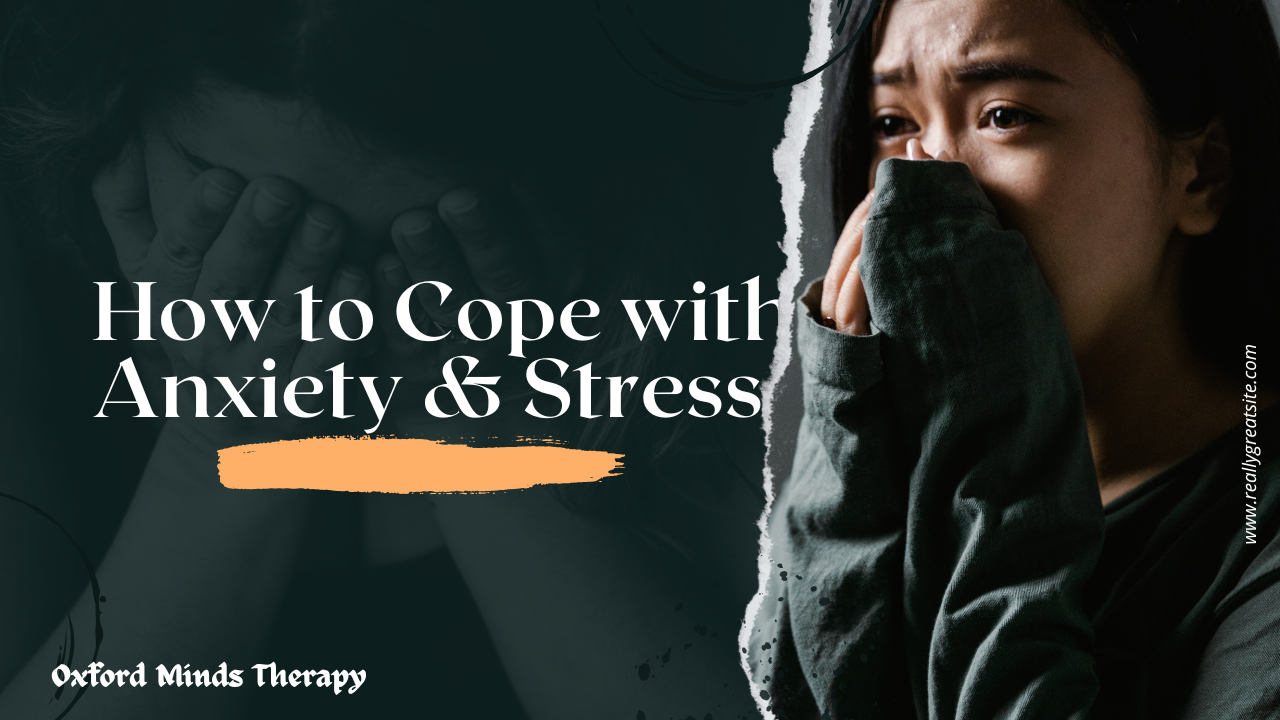Anxiety and stress are natural responses to life’s challenges, but when they become overwhelming, they can significantly impact our well-being. At Oxford Minds Therapy, I believe in empowering you with practical strategies to manage these feelings effectively. Here, I explore evidence-based techniques, including Neurolinguistic Programming (NLP) and Hypnotherapy, to help you regain control and find balance.

Understanding Anxiety and Stress
Anxiety is a heightened state of worry or fear, often triggered by perceived threats. Stress, on the other hand, is the body’s reaction to pressure or demands. While both can motivate us to act, prolonged exposure can lead to physical and emotional exhaustion.
For example, imagine preparing for a job interview. A moderate level of stress might sharpen your focus and encourage preparation. However, excessive anxiety could lead to sleepless nights and self-doubt, hindering your performance.
Book your Discovery Call here or contact me for a Quick Chat!
Phone: +447826 966828
WhatsApp: +447826 966828
Email: Victoria@PeopleBuilding.co.uk
Practical Strategies for Coping
Practice Mindfulness and Relaxation Techniques
Mindfulness involves focusing on the present moment without judgment. Techniques such as deep breathing, progressive muscle relaxation, and meditation can help calm the mind and reduce physical tension. For instance, try the “4-7-8” breathing method: inhale for 4 seconds, hold for 7 seconds, and exhale for 8 seconds. This simple exercise can be done anywhere and is particularly effective during moments of acute stress.
Neurolinguistic Programming (NLP)
NLP is a psychological approach that can help you reframe negative thoughts and beliefs, reducing anxiety and stress. For example, if you think, “I’ll fail this presentation,” NLP techniques encourage you to replace this thought with a positive affirmation, such as “I am prepared and capable.”
Hypnotherapy
Hypnotherapy uses guided relaxation, intense concentration, and focused attention to achieve a heightened state of awareness, commonly known as a trance. This approach can help you access your subconscious mind to address anxiety and stress. Hypnotherapy can assist in changing patterns of thinking and behaviour, promoting a sense of calm and control. For example, as a hypnotherapist I might guide you to visualise a serene environment, helping to reduce stress during challenging situations.
Book your Discovery Call here or contact me for a Quick Chat!
Phone: +447826 966828
WhatsApp: +447826 966828
Email: Victoria@PeopleBuilding.co.uk
Engage in Physical Activity
Regular exercise is a proven stress reliever. Activities like walking, cycling, or yoga release endorphins, the body’s natural mood elevators. Even a short 20-minute walk in a beautiful countryside can provide a refreshing mental reset.
Establish a Routine
Structure and predictability can reduce feelings of chaos and uncertainty. Create a daily schedule that includes time for work, relaxation, and self-care. For example, set aside 30 minutes each evening to unwind with a book or a warm bath.
Seek Social Support
Sharing your feelings with trusted friends or family members can alleviate the burden of anxiety. Joining local support groups or engaging in community activities can also foster a sense of connection and belonging.
Limit Stress Triggers
Identify and address sources of stress in your life. This might involve setting boundaries, delegating tasks, or practicing assertiveness. For instance, if work demands are overwhelming, communicate your concerns with your manager and explore solutions together.
When to Seek Professional Help
While self-help strategies are valuable, there are times when professional support is essential. If anxiety or stress significantly interferes with your daily life, consider reaching out to a therapist. Oxford Minds Therapy offers tailored interventions to help you navigate these challenges.
Conclusion
Coping with anxiety and stress is a journey that requires patience and practice. By incorporating these strategies into your daily life, you can build resilience and foster a sense of calm. Remember, seeking help is a sign of strength, not weakness. At Oxford Minds Therapy, we are here to support you every step of the way. Together, we can create a brighter, more balanced future.
By Victoria N Waligo
https://oxfordmindstherapy.pbnlp.org/
Book your Discovery Call here or contact me for a Quick Chat!
Phone: +447826 966828
WhatsApp: +447826 966828
Email:Victoria@PeopleBuilding.co.uk
